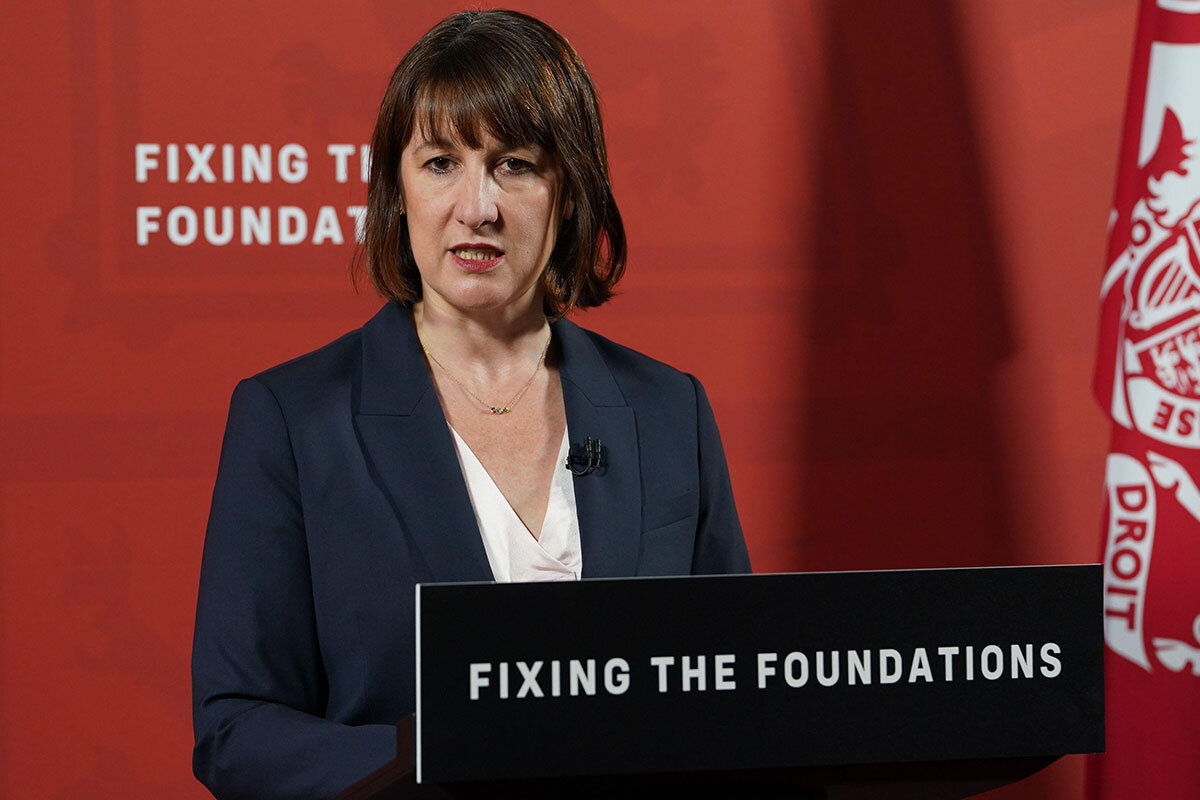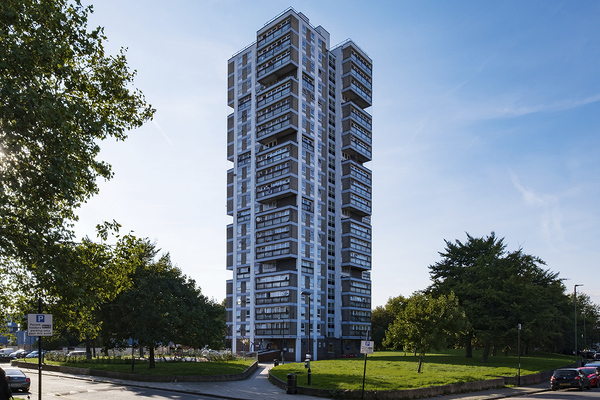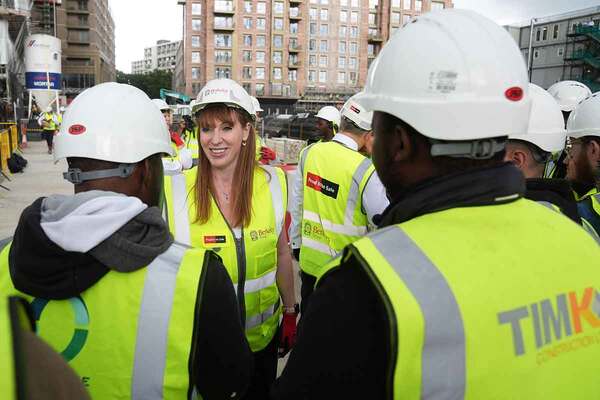Reeves reportedly planning 10-year rent settlement for Budget in October
Chancellor Rachel Reeves is reportedly planning to introduce a 10-year rent settlement for social landlords in the next Budget on 30 October.
According to the Financial Times, Ms Reeves intends to increase annual rents in England by the Consumer Price Index (CPI) measure of inflation – which currently stands at 2.2% – plus an extra 1%.
Its report said the settlement aims to encourage the building of affordable homes by providing certainty over cashflow to housing associations and councils.
The news came after London’s biggest landlords called on the government to introduce a rent settlement that lasted for a minimum of 10 years and guarantee it will not be altered.
The housing sector has faced uncertainty around rents since then-chancellor George Osborne scrapped a 10-year settlement in 2015.
Most recently, a five-year settlement of CPI+1% was announced in 2020, but rents were later capped at 7% after inflation surged in 2022.
The new government has promised “rent stability” for social landlords, with Angela Rayner, the deputy prime minister and housing secretary, pledging more direct grant funding and greater certainty around rents to help social housing providers “plan for the future”.
Sector leaders have welcomed news of the chancellor’s plans. Fiona Fletcher-Smith, chair of the G15, said: “This policy could significantly enhance the delivery of new affordable homes in London and across the UK. Although it is yet to be confirmed, it represents a crucial first step towards providing the stability and financial certainty that not-for-profit housing associations need.”
She continued: “If the government commits to the reported 10-year plan for rent settlement, it could be transformative for our sector, but it must be part of a broader strategy to address the social housing crisis.”
Andy Hulme, chief executive of housing association Hyde, said a 10-year settlement would give landlords “the certainty we need to invest in the homes we provide and to continue playing our vital role in building new affordable homes”.
“However, we’ve been let down over promises of a long-term settlement before, so the sector will be keen to secure assurances from the new government of how this commitment will be honoured when it announces its plans,” he added.
Scott Black, chief operating officer at Places for People, said the settlement “will give us the certainty and renewed confidence we need to continue to invest in our customers’ homes and the impetus to progress faster with our ambitious new homes delivery plan”.
Geeta Nanda, chief executive of MTVH, said: “Long-term stability and certainty on rents are essential to the housing sector, and we are encouraged to see that the government’s recognises this.
“A long-term settlement on social rents as part of a package of support measures, will better enable housing providers to meet the growing challenges of investment in existing homes alongside the delivery of desperately needed new, social, and affordable homes.”
Richard Petty, head of UK residential valuation at property consultancy JLL, said: “If this is true, it’s exactly what the social housing sector has been asking for. It will boost valuations. But we’ve been here before, so it will need to be absolutely immutable.”
He added: “The trick will be to ensure that the revenue is channelled in the right direction into investment in new homes… If we are serious about improving the energy efficiency and quality of existing stock, as well as delivering new affordable homes, either something has to give or funding has to be put in place to do both.”
Priya Nair, chief executive of The Housing Finance Corporation, said: “We welcome the increased certainty that this would provide housing associations when it comes to cashflow management and investment, as well as the role it should play in encouraging further investment into the sector.”
She added that a rent settlement is “just one of several policy solutions needed to rebuild financial capacity and unlock further investment… We need to turn the dial – new forms of private capital and new partnerships between the market and the sector, with a considered approach to risk”.
Tom Kerridge, policy and research manager at homelessness charity Centrepoint, said: “We welcome more financial incentives aimed at dramatically boosting the building of social housing. It’s vital, however, that any rent increases are reflected in extra support for those receiving benefits, especially at times when inflation is particularly high.”
In a report earlier this week, the G15 group of London housing associations said: “Rents make up the bulk of our income, so if we know what our rental income will be [and] we will be able to access private finance at cheaper rates.”
Rent stability was also one of 20 demands from the UK’s largest council landlords, which published a report last month warning that the council housing system in England is “broken”.
The group said that an “unsustainable financial model and erratic national policy changes” have “squeezed their budgets and sent costs soaring”.
The report said: “Unless something is done soon, most council landlords will struggle to maintain their existing homes adequately or meet the huge new demands to improve them, let alone build new homes for social rent.
“Rather than increasing supply, the reality is that some councils will have no option but to sell more of their existing stock, on top of Right to Buy sales, to finance investment in an ever-shrinking portfolio of council homes.”
Polly Neate, chief executive of housing charity Shelter, said tenants also need protection to ensure their rents remained affordable. “As inflation can spiral out of control very quickly, there needs to be mechanisms in place to protect tenants from extreme rent rises that put them at risk of becoming homeless,” she stated.
A spokesperson for the Ministry of Housing, Communities and Local Government said: “Work is ongoing to fix the foundations of our housing and planning system and we will set out our plans at the next fiscal event.”
In June, Mark Washer, chief executive of SNG, told Inside Housing that his development plan to build 25,000 homes over the next decade depended on a rent settlement of CPI+1% for the next decade.
“If that ... doesn’t happen, that has a significant impact on the business,” Mr Washer said. “What would that mean in terms of the homes that we could deliver? You’re looking at 8,000 or 9,000 fewer homes in terms of that 25,000 ambition. It would be a third or so.”
In May, an analysis of rents by landlord Hyde suggested that 300,000 homes in London have diverged from the formula rent, which risks making them financially unsustainable.
Rachelle Earwaker, senior economist at the Joseph Rowntree Foundation, said: “The government has to balance the ability to build new social homes with social rents that families can afford. Getting this balance right is crucial if we’re to make any progress on building the necessary social homes to end our housing crisis.”
She added: “Our social security system must cover rents for those on the lowest incomes and secure, affordable homes should be available for those that need them.”
Sign up for our development and finance newsletter
Already have an account? Click here to manage your newsletters












